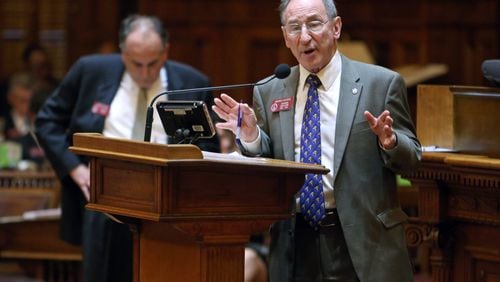Georgia lawmakers are considering a tax credit program that would steer $7 million a year into an “innovation” fund for school improvement, but questions about its constitutionality could derail the measure despite the key role it is supposed to play in improving low-performing schools.
House Bill 237 creates a new funding stream for a foundation controlled by the Governor's Office of Student Achievement, an education agency reporting to Gov. Nathan Deal. The legislation, by Rep. Brooks Coleman, R-Duluth, establishes a tax credit much like the one that allows taxpayers to contribute to a private school scholarship fund while recouping their entire contribution via a reduction in their taxes owed the state.
The “Public Education Innovation Fund Foundation” would provide competitive grants for school "innovation" efforts, with schools deemed "unacceptable" by GOSA given priority.
The idea is to find models for school improvement that can be replicated across the state.
The tax credits would be capped at $7 million until 2026, when the limit would rise to $10 million.
The bill was wildly popular in the House of Representatives, where it passed by a vote of 165-1 on Feb. 24. It’s been held up in the Senate Finance Committee, where it was tabled last week and remained tabled after a meeting Monday.
Committee member Sen. Bill Heath, R-Bremen, questioned the constitutionality of using tax credits for contributions, even though they're already in use for the private school scholarship program, which could expand during this legislative session under House Bill 217, and for a new hospital funding program.
Armed with an opinion from legislative counsel, he pointed to a part of the state constitution that says "all revenue collected from taxes, fees, and assessments for state purposes ... shall be paid into the general fund of the state treasury.” The only exception is for agricultural products.
“I believe HB 237 is unconstitutional,” Heath told The Atlanta Journal-Constitution through a spokeswoman, referring to Coleman’s bill. In regard to HB 217, the scholarship tax credit expansion, he said “this bill amends existing code that is most likely unconstitutional for the same reasons as HB 237. I voted for the original language not knowing at the time that it was likely unconstitutional.”
The Georgia Supreme Court is considering the legality of the scholarship tax credit program, after hearing oral arguments in January in a 2014 lawsuit in Fulton County.
The constitutional issue could influence the success of the school turnaround legislation should it become law.
Coleman, the chairman of the House Education Committee, has described his bill as a crucial companion to House Bill 338, which is backed by Deal and is a follow-up effort to address low-performing schools after voters rejected Deal's proposed constitutional amendment last year to establish a state-run Opportunity School District.
“It’s critical funding for low-performing schools,” Coleman said.
About the Author



/cloudfront-us-east-1.images.arcpublishing.com/ajc/P7DYBH6TO7FEKG4SUXQQKADRXE.jpg)



